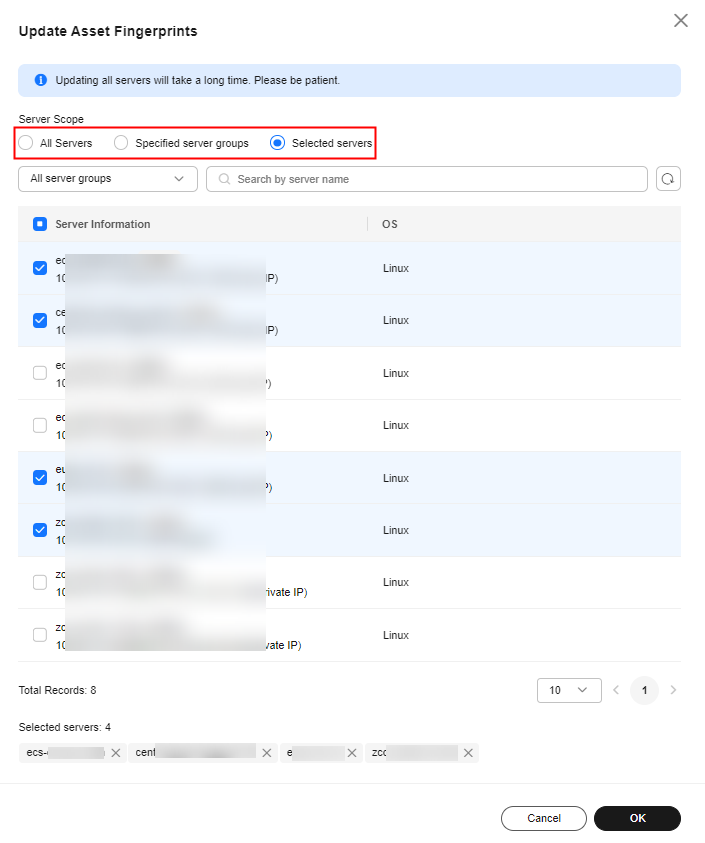Collecting Server Asset Fingerprints
Scenarios
HSS can collect server fingerprints, including information about ports, processes, web applications, web services, web frameworks, and auto-started items. You can centrally check server information and detect risky assets in a timely manner based on the server fingerprints. This section describes server asset fingerprints and their collection method.
Constraints
The server fingerprint function is available in HSS enterprise, premium, WTP, and container editions. For details about how to purchase and upgrade HSS, see Purchasing an HSS Quota and Upgrading a Protection Quota.
Server Fingerprint Collection Items
Server fingerprints: accounts, open ports, processes, software, auto-started items, web applications, web services, web frameworks, websites, middleware, kernel modules, and databases. For details, see Server Fingerprint Collection Items.
Server Fingerprint Collection Modes
Server fingerprints can be collected automatically or manually. For details about how each type of fingerprints is collected, see Table 2.
After the agent is installed on a server, the fingerprints of the server will be collected for the first time immediately. By default, the automatic collection period starts from the time when the agent installation succeeded.
|
Item |
Automatic Check Frequency |
Manual Collection Method |
|---|---|---|
|
Accounts |
Automatic check every hour |
Manually Collecting the Latest Asset Fingerprints of All Servers |
|
Open ports |
Automatic check every 30 seconds |
Manually Collecting the Latest Asset Fingerprints of All Servers |
|
Processes |
Automatic check every hour |
Manually Collecting the Latest Asset Fingerprints of All Servers |
|
Installed software |
Automatic check every day |
Manually Collecting the Latest Asset Fingerprints of All Servers |
|
Auto-started items |
Automatic check every hour |
Manually Collecting the Latest Asset Fingerprints of All Servers |
|
Websites |
Once a week (04:10 a.m. every Monday) |
|
|
Web frameworks |
Once a week (04:10 a.m. every Monday) |
|
|
Middleware |
Once a week (04:10 a.m. every Monday) |
|
|
Kernel module |
Once a week (04:10 a.m. every Monday) |
|
|
Web services |
Once a week (04:10 a.m. every Monday) |
|
|
Web applications |
Once a week (04:10 a.m. every Monday) |
|
|
Databases |
Once a week (04:10 a.m. every Monday) |
Manually Collecting the Latest Asset Fingerprints of a Single Server
If you want to obtain the latest data of assets such as web applications, web services, web frameworks, websites, middleware, kernel modules, and databases in real time, you can manually collect fingerprint information.
- Log in to the HSS console.Log in to the management console.
- Click
 in the upper left corner and select a region or project.
in the upper left corner and select a region or project. - In the navigation pane, choose . Click the Servers tab.
- (Optional) If you have enabled the enterprise project function, select an enterprise project from the Enterprise Project drop-down list in the upper part of the page to view its data.
- Click the name of the target server. On the server details page that is displayed, choose .
- Click a fingerprint in the fingerprint list, and click Discover Assets on the upper area of the list on the right.
Currently, only the information about web applications, web services, web frameworks, websites, middleware, kernel modules, and databases can be manually collected and updated in real time. Information about other types is automatically collected and updated every day.
Figure 1 Collecting data now
- After the automatic execution is complete, the last scan time is updated and the latest server asset information is displayed.
Manually Collecting the Latest Asset Fingerprints of All Servers
To view the latest fingerprints of all server assets in real time, you can manually collect fingerprints.
- Log in to the HSS console.Log in to the management console.
- Click
 in the upper left corner and select a region or project.
in the upper left corner and select a region or project. - Choose .
- In the upper right corner of the page, click Update Asset Fingerprints.
- Select the server update scope and click OK.
Figure 2 Updating asset fingerprints

- After the Updating Asset Fingerprints status disappears from the button in the upper right corner of the page, you can view the latest asset fingerprints.
Follow-up Procedure
After the server fingerprints are collected, you can view the latest asset fingerprint data. For details, see Viewing Server Asset Fingerprints.
Feedback
Was this page helpful?
Provide feedbackThank you very much for your feedback. We will continue working to improve the documentation.






